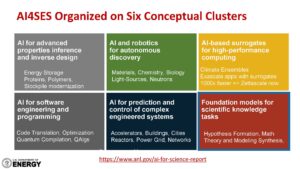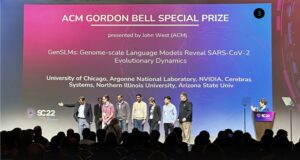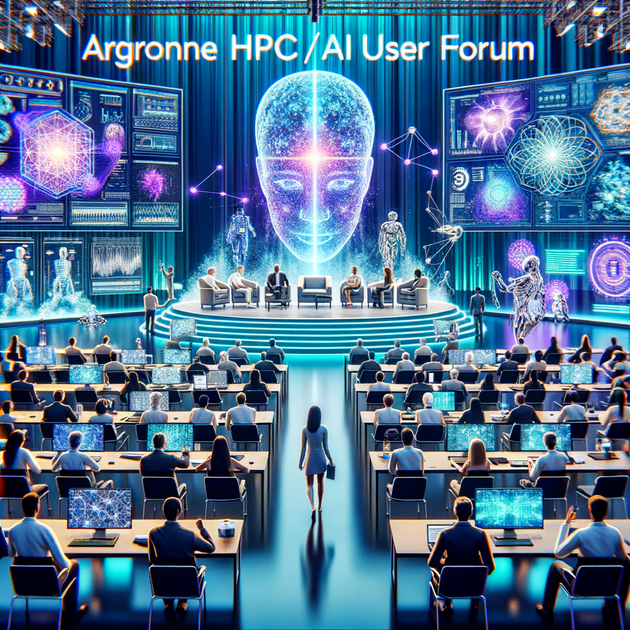Revolutionizing AI: Highlights from the Argonne HPC/AI User Forum
Artificial intelligence isn’t just a buzzword—it’s a transformative force reshaping industries and pushing the boundaries of what’s possible. If you’re tuned into the world of high-performance computing (HPC), you already know that AI is making waves. The recent HPC/AI User Forum held at Argonne National Laboratory showcased this shift, bringing together experts and visionaries to discuss the future of AI in scientific research and beyond.
Rick Stevens: A Pioneer’s Perspective
Rick Stevens, a leading figure at Argonne National Laboratory, kicked off the event with a riveting presentation that spanned the laboratory’s storied past and its forward-thinking focus on AI. He emphasized that AI is now the “dominant driver” of technological and economic progress. The global landscape of AI competition, involving both allies and adversaries, was a key theme.

A slide from Stevens’s presentation discussing Six Conceptual Clusters. Credit: Argonne National Laboratory
Stevens underscored the rapid advancements in AI by comparing music generated by AI just 18 months apart, illustrating the profound leaps in capabilities. “I do almost no coding these days without using AI as a helper,” he noted, highlighting AI’s pervasive influence even at a personal level.
Future Focus Areas for Argonne
Stevens discussed several key areas where Argonne will focus its AI efforts:
- AI for science
- Autonomous discovery
- Coherent x-ray science
- Imaging and detection of signatures
- Climate actions
- Carbon management
- Circular economy
The Trillion Parameter Consortium (TPC)
In his second talk, Stevens introduced the Trillion Parameter Consortium (TPC), an international collaboration aimed at creating generative AI models for scientific discovery. The consortium’s goals include:
- Building an open community of researchers to advance large-scale generative AI models.
- Coordinating projects to maximize impact and avoid redundancy.
- Creating a global network of expertise for training the next generation of AI researchers.
“The TPC itself is not building a model,” Stevens clarified. “It’s about building an open community and incubating projects.”
AI in Medicine: Insights from Arvind Ramanathan
Arvind Ramanathan, a Computational Science Leader at Argonne, provided a fascinating look into AI’s role in medicine. He highlighted the inefficiencies and challenges in current medical research, such as the reproducibility crisis and fragmented data sets. Argonne aims to overcome these hurdles through autonomous discovery enabled by AI and robotics.

The AI for Medicine work performed in the GenSLMs project won the ACM Gordon Bell Special Prize at SC22. Credit: Argonne National Laboratory
Ramanathan discussed an innovative approach to antimicrobial peptides (AMPs) synthesis, leveraging AI to navigate the astronomical number of possible amino acid combinations. “Traditional approaches are impossible,” he said, stressing the need for AI-driven solutions.
Karthik Kashinath and NVIDIA’s Earth-2 Project
Karthik Kashinath, a principal scientist at NVIDIA, captivated the audience with the Earth-2 project. This ambitious initiative aims to create a kilometer-scale digital twin of the Earth for weather and climate simulations. The goals are:
- High-Resolution Climate Simulation: Achieving detailed simulations at a granular level.
- AI-Powered Climate Prediction: Using GenAI to accelerate climate predictions.
- Interactive Visualization: Enabling dynamic interaction with simulation data.
NVIDIA’s cutting-edge hardware, including the Grace-Hopper GPUs, is set to drive these ambitious goals, promising significant computational and energy efficiency gains.
Final Thoughts
As AI continues to evolve and integrate into various facets of scientific research and beyond, the insights and innovations shared at the Argonne HPC/AI User Forum are a testament to the technology’s transformative potential. From Rick Stevens’ historical and forward-looking perspectives to Arvind Ramanathan’s groundbreaking medical applications, and Karthik Kashinath’s ambitious climate simulations, it’s clear that the future of AI is bright and boundless.
How do you see AI reshaping your industry? Share your thoughts and join the conversation!
